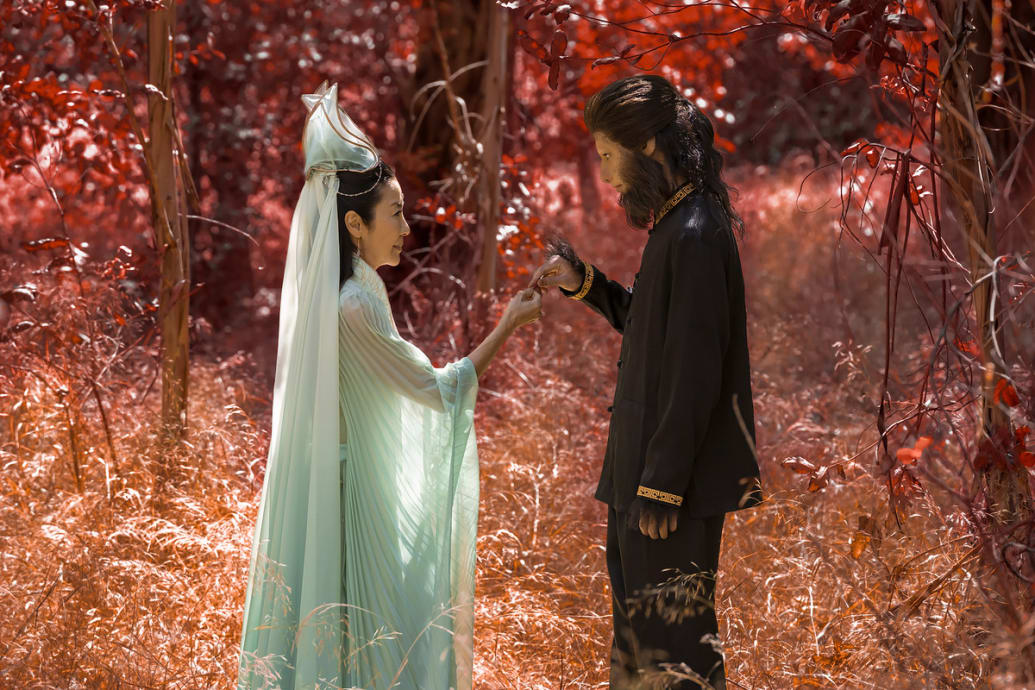It’s impossible to miss the look of horror on high school Jin Wang’s face in Disney+’s new YA-action drama Chinese American, when a teacher assigns him a “shadow” from a new student from China. Although the instructor insists that he and his new student Wei-Chen have “a lot in common”, Jin asks, “Do we?” She can’t help but ask.
The teacher does not hear him. Then again, who does? Our reluctant hero has all the classic high school desires: assemble the team (in this case football), get the girl (Amelia) and make a name for yourself. Jin’s mother would love for him (and therefore his father) to speak for her. But this newly minted tenth grader tries to reconcile those desires with the box that her white classmates always draw around her.
Jin wants to assimilate so badly that he never thinks about the one thing he clearly had in common with Wei-Chen from the very beginning: even the faculty doesn’t bother to pronounce their names correctly. Instead, Jin quickly rejects his “shadow”, whose total shamelessness shocks and frightens him in equal measure.
Chinese Americandebuting Wednesday on the streaming service, He plays with many of the classic features of the first-generation coming-of-age story, from laughing at offensive “jokes” to constantly deciding among his white peers which parts of his identity are fit for public consumption. In Jin’s mind, her choice seems to be twofold: either correct yourself and become popular, or let everyone see who she is and be ostracized. Luckily, the Disney+ series finds a force even stronger than high school popularity to help Jin see the conformist haze: Michelle Yeoh.
Well, not exactly – but in a way! Like the comic it adapted from author Gene Luen Yang, the eight-part series blends the mundane and the extraordinary for an interdimensional lesson. Boldly and delightfully played by Jimmy Liu, Wei-Chen is more than your average manga obsession; he is also a warrior and son of Monkey King Sun Wukong (Daniel Wu), whose epic mission rests on Jin’s shoulders. Convinced by a prophetic dream, Wei-Chen came to Earth (along with Yeoh, the Goddess of Mercy) to find Jin and save the Heavenly Realm from a disastrous uprising.
But first, Jin has football tryouts. Then, he has to make up with his old friend, whom he left outside to dry when his football buddies humiliated him. And Later, he still has to run after Amelia. Wei-Chen may be determined to save Heaven, but his guide is quite determined to his way on Earth. It will take a lot of time (and mind-blowing encounters) to break her from these worldly obsessions.

Published in 2006, Chinese American It is resolved in three stories that come together. First, a contemporary retelling of the classical Chinese novel Journey to the Westfollows the “Monkey King”, who is dissatisfied with himself as an ape, and attempts to gradually transition into human form. The latter follows Jin as his family moves from Chinatown in San Francisco to a white suburb where he is one of several Asian American students.
Like the Monkey King, Jin supernaturally manages to transform into his aspirational self, a white teenager. And the third story of the book follows this Caucasian teenager whom Jin calls “Danny”, as readers discover that the stereotypical “Chinese” cousin who visits Danny every year is actually none other than the Monkey King, and now he has Jin to accept him. she discovers that she is trying desperately to persuade. for who he is
Chinese American it blends these three layers, albeit in a collapsed state, with some of its sharpest teeth removed. However, the series’ incredible cast, stunning martial arts sequences, and superb production are instantly engaging. (Even if shapeshifting warriors initially look a bit like animorphs.)
Ben Wang perfectly embodies both the shrinking awkwardness of youth and the disturbing emotional turmoil that often underlies it. His quiet sensibility also runs counter to comedy timing, both physical and verbal—a deadly combination that makes it impossible to root for his character, no matter how sullen. Meanwhile, Liu’s Wei-Chen is both determined and strikingly empathetic. He’s also great in many of the show’s martial arts scenes—one against a pig-faced man in the school kitchen.

Yeoh seems to enjoy playing an interdimensional god who chooses to hang out in an earthbound apartment, advises Wei-Chen on his quest, and collects IKEA furniture for a while. (I should also say: The Heavenly wardrobe is simply stunning.) And then there’s the rest of the show’s superstar cast and crew, including Yeoh. Everything Everywhere at the Same Time castmates Ke Huy Quan (who initially sends in the kind of stereotypical roles that erode her Hollywood career) and Stephanie Hsu and Singaporean megastar Chin Han. Lucy Liu even came to directing.
As lonely as Jin might initially feel Chinese American, the series featuring it feels almost universal in its appeal. treacherous, funny and at the same time charming without being sensitive and like many wuxia movies come with action equally thoughtful. In the end, it becomes impossible for our shrinking hero to be forgotten.
Did you like this review? Sign up to receive weekly See. Skip newsletter Every Tuesday and find out which new shows and movies are worth watching and which are not.